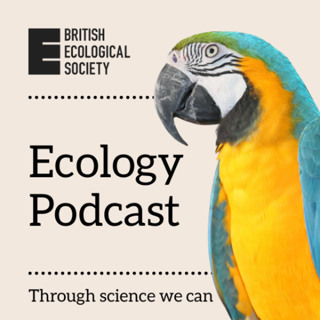
Functional Ecology | Fernando Gonçalves: Pollen essential amino acids shape bat–flower interaction networks
In this podcast, Functional Ecology author Fernando Gonçalves talks to Assistant Editor Amelia Macho about his article "Pollen essential amino acids shape bat–flower interaction networks". Fernando's article discusses how pollen protein and amino acid composition influence year-round and seasonal bat–flower interaction networks. Its results underscore the essential role of pollen, not just nectar, as a key reward for attracting flower-visiting bats, and therefore highlights pollen content as an important driver structuring pollination networks. Read the full article here: https://doi.org/10.1111/1365-2435.70161 Check out a video of the bat species in this study! https://youtu.be/7FX2x4T45i8?si=be7V7t3gAwBR4yiw
31 Okt 31min

ELM Network | Episode 4: Leading with clarity and kindness with Professor Sallie Bailey
As part of our 'Community' series, we’re launching the Emerging Leadership Management (ELM) Network, hosted by Rob Brooker, Thorunn Helgason, and Pen Holland.This is the podcast for people who love to lead or one day might emerge as a leader. This episode features Professor Sallie Bailey, Chief Scientist at Natural England and inaugural BES Fellow. Sallie shares insights from her leadership journey, from shaping strategy and managing expectations to driving cultural change across organisations. We discuss what makes communication effective, how leaders can bring clarity and energy to their teams, and why strong leadership is vital for lasting impact.
30 Okt 45min

Spiders Spotted Using Trapped Fireflies to Lure Prey | The Story Behind The Paper
For the Journal of Animal Ecology's latest podcast episode, Associate Blog Editor Edie Abrahams speaks with Professor I-Min Tso about his recently published paper, "Prey bioluminescence-mediated visual luring in a sit and wait predator". Professor Tso reflects on his journey into the world of spiders and what he learnt from conducting his study, as well as providing some valuable insights for those who are interested in pursuing a career in the area. You can find some helpful links below: Paper: https://doi.org/10.1111/1365-2656.70102 Website: https://www.spiderandsilksupply.com/
21 Okt 56min

Included in Nature with Clare Rishbeth | Introduction
This series will be discussing four evidence reports commissioned by Natural England which were deposited on Applied Ecology Resources and explored the importance of nature inclusion across various communities; people with disabilities, older people, ethnic minorities, and those in low-income areas. This series will be deep diving into the importance of nature connection, the potential barriers to inclusion for four specific groups of individuals, and strategies to overcome them. Our guest is Clare Rishbeth, who is a professor in Landscape Architecture from the University of Sheffield and co-authored the reports. Clare explains the reason for the reports and for the focus on four specific groups of people. The reports are linked below: People with Disabilities https://www.britishecologicalsociety.org/applied-ecology-resources/document/20220436861/ Low Income Areas https://www.britishecologicalsociety.org/applied-ecology-resources/document/20220436862/ Older People https://www.britishecologicalsociety.org/applied-ecology-resources/document/20220436863/ Ethnic Minorities https://www.britishecologicalsociety.org/applied-ecology-resources/document/20220436860/
7 Okt 8min

Included in Nature with Clare Rishbeth | Case Report 1 - Disabilities
This series will be discussing four evidence reports commissioned by Natural England which were deposited on Applied Ecology Resources and explored the importance of nature inclusion across various communities. In this episode, Clare will be discussing the barriers to inclusion for those with disabilities, and how we might be able to overcome them. PEDALL Inclusive Cycling | New Forest National Park - https://www.pedall.org.uk/ Sensing Nature - https://sensing-nature.com/ Applied Ecology Resources Report: People with Disabilities - https://www.britishecologicalsociety.org/applied-ecology-resources/document/20220436861/
7 Okt 11min

Included in Nature with Clare Rishbeth | Case Report 2 - Low Income Areas
This series will be discussing four evidence reports commissioned by Natural England which were deposited on Applied Ecology Resources and explored the importance of nature inclusion across various communities. In this episode, Clare will be discussing the barriers to inclusion for those in low-income areas, and how we might be able to overcome them. Applied Ecology Resources Report: Low Income Areas - https://www.britishecologicalsociety.org/applied-ecology-resources/document/20220436862/
7 Okt 13min

Included in Nature with Clare Rishbeth | Case Report 3 - Older People
This series will be discussing four evidence reports commissioned by Natural England which were deposited on Applied Ecology Resources and explored the importance of nature inclusion across various communities. In this episode, Clare will be discussing the barriers to inclusion for older people, and how we might be able to overcome them. Wild at Heart, Sheffield & Rotherham Wildlife Trust - https://www.wildsheffield.com/discover/your-community/wild-at-heart/?srsltid=AfmBOooBDMSVIiz51JkVIAN2lotY4qAD5uogVfGTUXRPAOWbK6BOnBs8 Welcome to DalesBus - https://www.dalesbus.org/ Applied Ecology Resources Report: Older People - https://www.britishecologicalsociety.org/applied-ecology-resources/document/20220436863/
7 Okt 10min

Included in Nature with Clare Rishbeth | Case Report 4 - Ethnic Minorities
This series will be discussing four evidence reports commissioned by Natural England which were deposited on Applied Ecology Resources and explored the importance of nature inclusion across various communities. In this episode, Clare will be discussing the barriers to inclusion for ethnic minorities, and how we might be able to overcome them. The Queen Elizabeth Olympic Park: Whose Values, Whose Benefits? by Dr. Bridget Snaith - https://openaccess.city.ac.uk/id/eprint/19291/ 9 Rules for the Black Birdwatcher by J. Drew Lanham - https://orionmagazine.org/article/9-rules-for-the-black-birdwatcher/ Applied Ecology Resources Report: Ethnic Minorities - https://www.britishecologicalsociety.org/applied-ecology-resources/document/20220436860/
7 Okt 20min





















